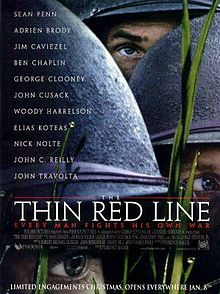In his career lasting over four decades, Terrence Malick has directed five feature length films. He released his debut film, Badlands, in 1973 to great acclaim before releasing what some consider his magnum opus, Days of Heaven (1978). He then disappeared from the film scene for 20 years until releasing The Thin Red Line in 1998. Since then, he has directed two more films, the temperately received The New World (2005) and the phenomenal (in my opinion, at least) The Tree of Life (2011).
I had only seen Days of Heaven and The Tree of Life prior to watching The Thin Red Line, but they were two movies I had immense respect for. I found The Thin Red Line to not only continue but to increase my admiration for the elusive Malick. Within his works, Malick has created a style that allows his films to speak on a different level than most films. As opposed to using a traditional narrative style, Malick instead waxes philosophical, utilizing long takes showing beautiful images of nature, while a voiceover takes the viewer through a philosophical meditation on man’s meaning and place in the universe.
The Thin Red Line continues Malick’s exploration of ordinary characters dealing with the struggles of life. There is no true main character in the movie, as Malick uses an ensemble cast for his story. However, Malick expertly weaves through his cast, showing the characters within the warzone they inhabit before quietly retreating into their minds for them to deliver Malick’s trademark voiceovers. One of the film’s main concerns is man’s identity – as he steps into foreign lands, slaughtering strangers in the name of abstract concepts, how different is he from the combatants? Perhaps, as one characters remarks, all men have one soul that they share, that all faces are faces of the same man. During the voiceovers, all of the actors speak in a calm, meditative voice, creating a similarity between the speakers. The speaker is identified through camerawork, yet sometimes Malick doesn’t carefully define who is speaking, creating the impression that perhaps they all truly are the same person.
Malick is one of the great filmmakers alive today. He has surprisingly announced two upcoming films, generating much excitement within the film world.



